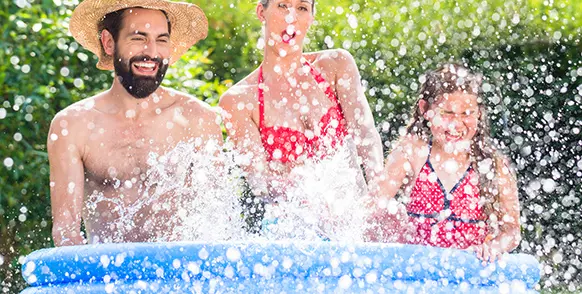
Even though the days are long, summer is too short to miss due to a safety misfortune that could have been avoided. Here are some safety tips to keep your family safe through those long days of summer.
Staying Cool in the Heat
When the temps start to rise, your body’s ability to regulate temperature is compromised. This can result in a host of illnesses including heat cramps, heat exhaustion, hyperthermia or heatstroke. According to the Centers for Disease Control and Prevention, there are things you can do to protect yourself if you’re going to be in hot conditions:
- Drinking plenty of water and fluids. Don’t wait to re-hydrate when you’re thirsty. And avoid alcohol, caffeine and carbonated drinks – these can leave your body more dehydrated.
- Eat meals that are light and well-balanced. Avoid high-protein foods because they increase metabolic heat and can add to water loss.
- Protect your skin from the sun. Use sunscreen even if the sun is not out and wear light, protective clothing. Hats are great for additional protection on the face and neck.
- Heatstroke is the most serious form of hyperthermia and it’s a medical emergency. Know the signs of a heat stroke: throbbing headache, confusion, nausea, dizziness, body temperature above 103°F, hot, red, dry or damp skin, rapid and strong pulse, fainting, loss of consciousness. If you think someone is having a heat stroke, call 911 or get the victim to the hospital immediately.
Red Flag Warnings
According to the National Weather Service, a Red Flag Warning means warm temperatures, very low humidity, and strong winds are expected to combine to produce an increased risk of wildfire and fire danger. All fires should be extinguished properly. Never leave a fire or flame unattended – drier conditions allow sparks or embers to easily ignite leaves or grass.
The main causes of outdoor cooking fires are failing to clean the cooking grate, leaving the grill unattended, leaving something combustible nearby or having gas leaks. If you choose to grill outdoors, you’ll want to exercise more caution than you normally do. If you use charcoal, make sure you dunk the charcoal in water until they’re cold and do not throw live charcoal on the ground and leave it.
Water Safety
One of the best ways to cool off in the summer is at the pool or at the lake. The next time you’re cooling off in water, the Centers of Disease Control and Prevention says practice these tips to stay safe:
- If you have a boat, you are required to have at least one life jacket for everyone on board. It’s also good to have a boat safety kit that includes a flashlight, duct tape, a bucket, a first aid kit, a whistle, ropes, mirror and fire extinguisher.
- If you have a pool with small children or non-swimmer in your family, install a safety lock to prevent pool access. Installing a pool alarm can give you peace of mind and notify you if someone accesses your pool without permission. Make sure you have life-saving equipment in the pool area such as life jackets, a rescue hook or a rope with lifesaving rings.
- Prohibit any water games that involve holding your breath as long as you can, interacting with the pool drain, running around the pool, or dunking other swimmers.
- Know what drowning looks like: a drowning person is physiologically unable to call out or wave for help due to the body’s drowning response.
Home Security While on Vacation
Make sure your home is safe while on vacation. Locking the doors and windows is a great starting point but there are additional things you can do to protect your home while you’re away. Whether you have a home security system or not, have a neighbor or close friend check on your home while you’re gone. Make sure you turn off all electrical appliances, take out the garbage, unplug anything that could be affected by a power surge and store all your valuables in a safe. It’s also best to wait to post photos on social media until after you get back from your trip, so you do not give any clues that you’re away from your home.
Summer Home Maintenance
Seasonal maintenance of your home keeps it in the best condition possible and will help you avoid excessive costly damages. At the beginning of summer, carefully inspect both the inside and outside of your home for any signs of damage, wear and tear and pest or animal infestations. If you have central air in your home, getting a professional to check your air conditioner unit to make sure it’s ready to operate and cool your home efficiently. There are a few things you can do to the condenser (typically located outside) such as replacing the filters and cleaning the leaves and debris in the condenser left over from the winter months.
CommunityAmerica Insurance Agency is dedicated to helping you protect what matters most, with insurance offerings including auto, home, life and much more. Our local, knowledgeable Insurance Agents work with a variety of renowned national carriers to help get you the right coverage at the right price. If you'd like to get in touch with an insurance advisor, call 833.202.9595 or request a quote online.





